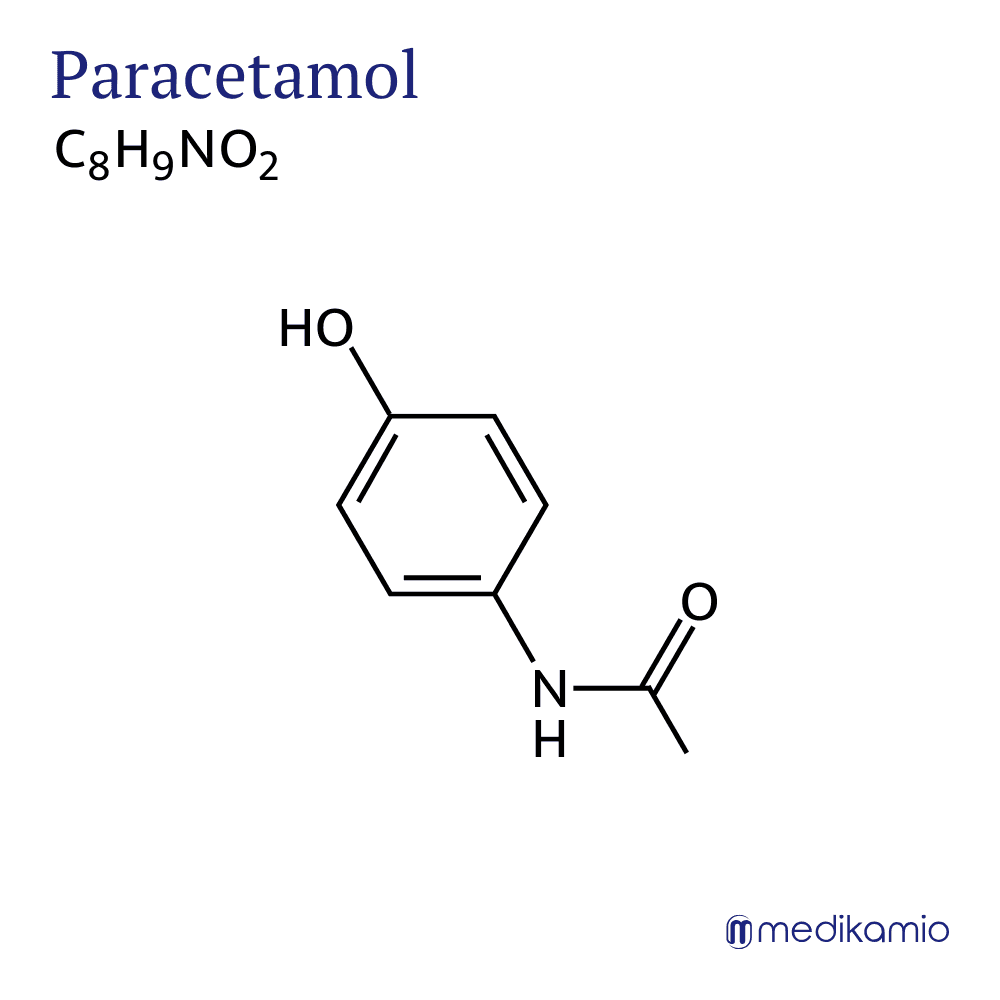Does paracetamol increase the risk of autism in children?
Paracetamol - a brief profile
Paracetamol or acetaminophen is an active ingredient for the treatment of mild to moderate pain and fever. It belongs to the group of analgesics and was approved back in the 1950s. Paracetamol was developed back in the 19th century and was one of the first synthetic active ingredients to treat fever. However, the exact mechanism of action is still not fully understood.

Paracetamol during pregnancy
Paracetamol, like many other drugs, is also placental, meaning that it can migrate via the maternal bloodstream into the placenta and from there into the child's circulation. In a study from September 2021, which was published in the Nature Journal, the authors report an increased risk of neuronal development disorders in children after taking paracetamol during pregnancy. The disorders include ADHD (attention-deficit/hyperactivity disorder) and ASD (autism spectrum disorder). Language development disorders and a reduced intelligence quotient are also included. However, the authors point out that the negative effects are very small, but the numbers are nevertheless very high due to the frequent and widespread use. It is not in the interest of the study authors to discontinue use, but pregnant women should be better informed about the potential risks. It is therefore advisable to only take paracetamol in the lowest possible dosage and for the shortest possible duration, they emphasize.
Another study from September 2022, which was published in the Plos One Journal, came to a similar conclusion. However, the authors of this study also took into account the mothers' stress levels during pregnancy. According to the authors, the stress factor was given little or no consideration in previous studies. Despite this consideration, they came to the conclusion that paracetamol can lead to sleep and attention disorders in children when taken during pregnancy. The negative effects were also very rare in this study, but are not insignificant due to the frequent and widespread use.

However, the authors faced strong opposition from well-known institutions such as the "Embryotox" Pharmacovigilance and Advisory Center for Embryotoxicology at the Charité in Berlin and the European Network of Teratology Information Services "ENTIS". They criticize a number of weaknesses in the studies. These include the incomplete inclusion of genetic factors and the social environment, the borderline statistical significance in many studies and the inconsistent use of diagnostic tools for the observations. They are of the opinion that there is no causal relationship and that possible familial factors are decisive for the results.
In a statement published in October 2021, the European Network of Teratology Information Services "ENTIS" clearly positions itself against the study published in the Nature Journal and emphasizes that paracetamol remains the drug of first choice in pregnancy. However, both also referred to the correct indication, the lowest dosage and the shortest duration of administration for the use of the painkiller.

Paracetamol in babies and toddlers - new findings
So far, studies have only looked at the use of paracetamol during pregnancy. A very recent study published in the Children Journal in December 2023 now points to an increased risk of autism spectrum disorder (ASD) after taking paracetamol in children. In pediatrics, paracetamol is the drug of choice, just as it is during pregnancy. It is administered after birth, usually in the form of suppositories. According to the authors of the study, paracetamol is often used too lightly, especially for fever or after vaccinations. They are particularly critical of the fact that although the painkiller affects brain function, it has never been confirmed that its use in babies and children is safe for neuronal development.
The authors were able to prove this through animal experiments, which showed an influence on brain development after taking paracetamol. In earlier studies on the safety of the active ingredient in babies and children, it was assumed that toxic effects would be the same in adults and children. However, this is not the case, according to the authors of the study. Based on these facts, extensive safety tests for pediatric use should have been carried out, according to the authors. They want to confirm their findings by comparing sales and ASA prevalence in Denmark and Finland. This shows that Denmark has significantly higher sales of paracetamol compared to Finland and at the same time a higher prevalence of autism spectrum disorders.

Conclusion
Paracetamol is one of the most important painkillers during pregnancy and for babies and small children. It has been in use for several decades and the only alternatives are ibuprofen, which can only be used in the first and second trimester of pregnancy and during breastfeeding, and acetylsalicylic acid or diclofenac, which should only be taken up to the 28th week of pregnancy. For back or neck pain, pregnant women can also use capsaicin in the form of ointments or gels after consulting their doctor. There are virtually no alternatives that can be used throughout pregnancy and breastfeeding. Nevertheless, a review of the established active ingredient is necessary. Studies on negative effects after taking the analgesic have been accumulating in recent years. The risk-benefit profile needs to be reassessed and the safety of the active ingredient needs to be checked to ensure that it can be used without negative consequences. There is growing uncertainty among pregnant women and parents, as the period from conception to the age of 5 is crucial for brain development. In case of doubt, however, a consultation at the pharmacy or with a gynecologist or pediatrician is still the best solution. For the time being, paracetamol remains the drug of choice during pregnancy and breastfeeding. However, if used according to indication and the lowest dose is taken for the shortest duration, the risks can be kept to a very low level, as virtually no active ingredient is free from side effects or risks.
Sources
- Springer Medizin Verlag
- Parker W, Anderson LG, Jones JP, Anderson R, Williamson L, Bono-Lunn D, Konsoula Z. The Dangers of Acetaminophen for Neurodevelopment Outweigh Scant Evidence for Long-Term Benefits. Children (Basel). 2023 Dec 29;11(1):44. doi: 10.3390/children11010044. PMID: 38255358; PMCID: PMC10814214.
- Zentrum der Gesundheit
- Sznajder KK, Teti DM, Kjerulff KH (2022) Maternal use of acetaminophen during pregnancy and neurobehavioral problems in offspring at 3 years: A prospective cohort study. PLoS ONE 17(9): e0272593. https://doi.org/10.1371/journal.pone.0272593
- Bauer, A.Z., Swan, S.H., Kriebel, D. et al. Paracetamol use during pregnancy — a call for precautionary action. Nat Rev Endocrinol 17, 757–766 (2021).
- Pharmazeutische Zeitung online - Die Zeitschrift der deutschen Apotheker
- Pharmakovigilanz- und Beratungszentrum für Embryonaltoxikologie der Charité-Universitätsmedizin Berlin
- Pharmakovigilanz- und Beratungszentrum für Embryonaltoxikologie der Charité-Universitätsmedizin Berlin
- ENTIS - European Network of Teratology Information Services
- Spektrum der Wissenschaft Verlagsgesellschaft mbH
- Bundesamt für Sicherheit im Gesundheitswesen Medizinmarktaufsicht

Thomas Hofko
Last updated on 08.03.2024
Your personal medication assistant
Browse our extensive database of medications from A-Z, including effects, side effects, and dosage.
All active ingredients with their effects, applications, and side effects, as well as the medications they are contained in.
Symptoms, causes, and treatments for common diseases and injuries.
The presented content does not replace the original package insert of the medication, especially regarding the dosage and effects of individual products. We cannot assume liability for the accuracy of the data, as the data has been partially converted automatically. Always consult a doctor for diagnoses and other health-related questions.
© medikamio